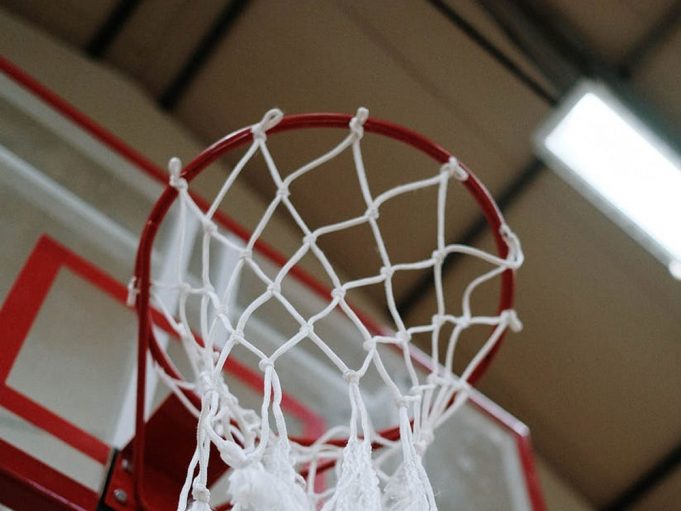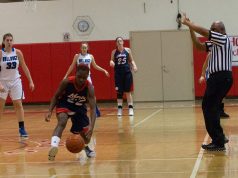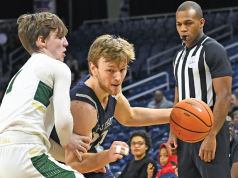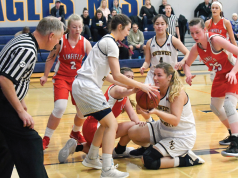J.D. Collins has heard plenty of colorful descriptions of his work during his time as an oncourt college basketball official and more recently in his role as the NCAA’s national coordinator of men’s basketball officiating.
However, he likely never saw the day when he would be compared to a prison warden. He has the unique environment of the 2021 NCAA Tournament to thank for it.
With leisure-time options limited for the 58 men’s basketball officials who found themselves confined to an Indianapolis bubble due to ongoing COVID-19 concerns and restrictions, the NCAA had to get creative to keep its tournament arbiters from going stir crazy. The decision was made to lease Victory Field — the home ballpark for the Triple-A Indianapolis Indians minor league baseball team — for four one-hour periods. The idea was to allow the officials to break up the monotony of Netflix binge sessions in their hotel rooms with some fresh air and exercise.
Never had tossing around a football, playing a few games of cornhole or enjoying a simple walk on fresh-cut grass felt so good. And when the moment came each time for the group to load back onto a bus and return to their bubble accommodations, Collins got an earful.
“All 58 of our officials would boo me in unison,” he said with a laugh. “We got time in the yard. We really enjoyed just getting that freedom more than anything. It gave us a boost.”
On one hand, it might seem hard to believe that a group of men and women chosen to work on the biggest stage afforded by their chosen avocation would need any type of psychological or physical intervention or enhancement. To have one’s name on the list of officials selected for the NCAA men’s and women’s basketball tournaments would, under normal circumstances, be more than enough adrenaline to fuel their own personal March Madness.
However, the madness manifested itself in a much different form in 2021. Coming on the heels of an unprecedented conclusion to the 2019-20 season when the COVID-19 pandemic caused the cancellation of all the NCAA’s national basketball tournaments, the return to postseason basketball was still anything but normal one year later. For tournament play to safely return, changes were going to be necessary.
The first domino came with the NCAA’s decision to hold both of its Division I tournaments at a single “location” rather than utilizing regional sites throughout the country that eventually winnowed down into a traditional Final Four city. The men’s tournament would ostensibly be held in Indianapolis, while using arenas throughout the Hoosier State, from West Lafayette in the northwest and Bloomington to the south, for early round games. The women’s tournament featured a similar approach, with San Antonio serving as the host, and nearby arenas in Austin and San Marcos also serving as de facto regional locations.
That decision meant Collins and Penny Davis, his counterpart in the NCAA women’s national coordinator role, needed to adjust their approach to staffing the games. In a normal year, each would reward approximately 100 officials with tournament assignments, such large numbers necessary as crews were needed in eight different regional locations spread across four time zones and thousands of miles. Upon the completion of each round of tournament play that number would shrink, until eventually a crew of 10 officials got the call to report to whatever city was hosting the Final Four, the pinnacle of each respective tournament.
The geography of the 2021 postseason, coupled with the NCAA’s desire to create an officiating bubble that would allow for tighter control and monitoring, and reduced exposure to the ills caused by COVID-19, made such a large number of officials not only unnecessary, but unwise. After consulting with NCAA staff, both Davis and Collins made the decision to invite a streamlined pool of 60 officials to work this year’s events.
“We had obviously a lot of challenges in front of us that complicated things,” said Davis, who in two years as the national coordinator has yet to have a normal tournament experience due to the pandemic. “We were kind of getting to sort of establish things for what we were doing because everything was brand new. There was no mold. … Certainly, there were a lot of good officials who weren’t selected that would have been in our typical pool.”
“At the time, you don’t know if it’s the right number,” Collins said. “At this particular time, in this year with COVID, it was exactly the right thing to do.”
Those 120 officials faced stiff restrictions before even stepping on the floor at their tournament sites. Upon arrival in either Indianapolis or San Antonio, they were required to take initial COVID-19 tests and quarantine in their hotel rooms, unable to even venture to the hotel pool, gym or lobby until receiving clearance from local health officials and the NCAA. Once the officials cleared initial quarantines, they still had to endure daily virus testing for the entirety of their tournament experience, were forced to change into and out of their uniforms at their hotels instead of on-site locker rooms, had to ride in approved shuttle buses to and from the arena, and could not even stick around following their own games to watch their fellow officials work games.
Almost immediately, a serious complication arose on the men’s side. Upon arriving Sunday, March 14, at the Le Meridien hotel in downtown Indianapolis, a group of six officials discovered their rooms were not quite ready and headed to Harry & Izzy’s, a nearby steakhouse, for an impromptu dinner. Upon their return to the hotel, at approximately 10 p.m., they were given a COVID-19 test and placed into quarantine, same as the other 54 officials.
One of the six was tournament fixture Roger Ayers, who had been invited to work March Madness every year since 2006. When he got to his room he placed his cell phone in “Do Not Disturb” mode and went to sleep. He awoke Monday morning to find he had three missed calls, all from an Indianapolis area code. His test had come back positive for COVID-19, and a second test was going to be required.
“They sent two nurses to my room. They were dressed in space suits. It was like I had the plague,” said Ayers, who earlier on Sunday had worked the championship game of the Atlantic 10 Tournament between VCU and St. Bonaventure at the Barclays Center in Brooklyn, N.Y. “I really thought, ‘This is a false positive.’”
About 90 minutes later, he discovered it wasn’t. Another phone call. The second test was also positive.
“I told the lady when she called the second time, ‘You get me a Starbucks and I can ref this morning,’” Ayers said.
Not only was that not going to be the case, he was being removed from the tournament under orders by Indiana state health officials. And to make matters worse, his five dining companions — John Gaffney, John Higgins, Kip Kissinger, Ray Natili and Ted Valentine — were also knocked out of the tournament due to contact tracing protocols.
Meanwhile, Ayers had to figure out how to deal with the immediate aftermath. The first order of business was sharing the information with those who needed to know.
“I had to make two hard calls that morning,” he said. “Obviously, I had to call J.D. Collins. There was immediate silence. And then he said something I’ll never forget. He said, ‘We’re going to take care of you.’ It took a huge burden off of me.
“The second hard call I had to make was to call those five guys.”
Once that was finished, and not showing any symptoms, Ayers had to try to convince health officials to let him travel to his home in Roanoke, Va., rather than suffer through a 10- to 14-day quarantine in his hotel room. With the help of Collins and the NCAA staff, he was able to secure a rental car and made the eight-hour drive home.
“The whole way home I felt fine. No symptoms. Tuesday night about 2 a.m., I woke up soaked in sweat and I couldn’t swallow,” Ayers said. “I said, ‘Uh-oh. This is the start of it.’ I steadily went downhill from there.”
He called his doctor Wednesday. On Thursday afternoon, he started having breathing issues. He went to a local hospital and went through a battery of X-rays and scans on his chest.
“That was probably the scariest part of this whole ordeal. I thought I would be reffing (Thursday), and instead I’m staring at a ceiling and wondering if I’m going to be OK,” Ayers said.
He convinced the doctors to not admit him to the hospital, returning home and enduring four days where he could barely get out of bed and walk to the kitchen to grab a Gatorade from the fridge. After about two weeks, he was able to take short walks in his neighborhood. Slowly but surely, he regained his physical health and now feels 100 percent.
Mentally, however, it’s been a tough couple of months as he struggles with guilt over what his positive test cost his dining companions.
“To know I had an influence on those guys not working, and it was not their fault, mentally, that’s been the toughest part of this whole thing,” Ayers said.
While Ayers’ health issue provided a troublesome start to the 2021 tourney on an officiating front, it was another tourney veteran, Bert Smith, who became the center of attention just two weeks later. College basketball fans and officials everywhere watched in horror as the Florence, Ky., resident collapsed to the floor approximately four minutes into the Elite Eight contest between USC and Gonzaga on March 30.
In real time, not much information was available, with CBS, which was broadcasting the game, cutting to a commercial. When the broadcast resumed, replays showed Smith pulling down his mask for a couple of possessions earlier in the game, apparently struggling to catch his breath, before a full-court view showed him dropping to the floor, unconscious on his feet.
“I didn’t have any signs or anything that said, ‘You’re not feeling well,’” said Smith, who went through his regular pregame routine and even sprinted back to the Lucas Oil Stadium locker room with crewmate Randy McCall just minutes before tipoff. “I remember starting to struggle, but the four minutes prior to that it was a normal game for me. I didn’t have any triggers that I was experiencing any problems at all.”
Once Smith came to, he was ready to resume the game with partners McCall and Doug Shows. The on-site medical personnel had other ideas. They asked Smith if he could sit up, and that’s when he noticed the stretcher that had been wheeled onto the court.
“And I look and I go, ‘What’s that for?’” he said with a laugh.
The doctors convinced Smith to sit on the stretcher for just a moment. Then they convinced him to swing his legs up onto it. At that point, Smith was strapped in and taken off the court, with a now indelible image of him on the stretcher, arms crossed, a scowl etched across his face.
“I just had all the emotions. So I’m just sort of frustrated, mad and not knowing what the heck’s going on,” Smith said.
Early speculation was Smith had been dehydrated. He was taken into the locker room and examined for a possible concussion — his head having struck the floor with plenty of force when he fell. Once the game was over, he returned to the hotel with McCall and Shows, who tried to convince him to visit the hospital and get checked out. Their appeals were finally heard, and after a shower at the J.W. Marriott hotel to freshen up, Smith went to IU Methodist Hospital.
At first, everything checked out. Smith’s vitals were normal and his brain was clear. However, a persistent emergency room physician had one lingering question.
“She just looked at me and she goes, ‘Something doesn’t add up. I want to know why you fell.’”
After a battery of tests, they had the answer, and it was much more worrisome than dehydration. Smith had a blood clot in his right lung, also known as a pulmonary embolism.
“I let my wife know. That was an emotional conversation,” Smith said. “I let J.D. (Collins) know. That was also an emotional conversation.”
According to Smith, his doctors don’t fully understand why the clot emerged, as he did not exhibit any of the telltale behaviors or symptoms that typically lead to a clot. They believe it began in his legs and traveled to his lung, and at some point lodged in a position that inhibited his oxygen intake, leading to his blackout and fall.
“What happened to me on the court was going to happen to me somewhere again, and maybe I don’t recover,” Smith said. “You go on Google and pop ‘pulmonary embolism’ in there, and you spend 10-15 minutes reading about it, and you sort of go, ‘Whoa!’
“Every one of us should value each day and not take it for granted.”
While the Ayers and Smith incidents both received the lion’s share of headlines regarding officiating during this year’s tournaments, plenty of additional personal storylines developed over the three weeks of March Madness competition, with each of the 118 officials who ultimately worked a tourney game emerging with a tale to tell.
Take the case of Fatou Cissoko-Stephens, who was no stranger to the bubble environment and the challenges it posed. Last summer, during her sixth season as a WNBA official, the Providence, R.I., resident found herself inside that league’s bubble at the IMG Academy in Bradenton, Fla.
The 11 nights she spent in the NCAA women’s tournament bubble in San Antonio as she advanced to the Sweet 16 was nothing compared to the 68 days she endured in the WNBA version.
“It definitely prepared me, because going into the WNBA bubble, I brought everything,” Cissoko-Stephens said. “I brought so much stuff, like I was going to camp. I wanted to make sure that I kept myself and everybody happy.”
Cissoko-Stephens streamlined the process in San Antonio, but it doesn’t mean she arrived without an array of creature comforts. Having experienced laundry issues in the WNBA bubble, she used FedEx to ship a mini washer and dryer setup to her hotel room in Texas. The music lover also brought along her turntables and speakers, serving as the unofficial DJ for the women’s officiating staff.
“A lot of times it’s preparation. You have to prepare for anything in life. If you do that, you can be successful,” Cissoko-Stephens said. “I knew I needed clean clothes, I knew I needed DJ equipment and I knew I needed snacks. That’s what I shipped down to be comfortable, to feel like home.
“We had a hallway dance party, and everyone was like, great, we can hear music, we can dance, we can live. It was almost like college-wise, you’re going back to a college atmosphere.”
Chuck Gonzalez didn’t necessarily need the dance steps. He was already getting plenty of physical exertion, and it had nothing to do with the number of tournament games he worked, culminating with the Women’s Final Four semifinal clash between Arizona and UConn.
When the 31-year NCAA veteran from Huntington Beach, Calif., checked into the officials’ first hotel, the Holiday Inn in San Antonio, he was assigned to the very last room on the ninth floor, farthest away from the stairs. That’s an important detail considering that, until all of the officials cleared quarantine procedures, none of them were allowed to use the hotel elevators.
“It was 162 steps, and I was doing it nine times a day,” said Gonzalez, who had to make the trek for each of his meals and to do his COVID testing. “I was walking the Empire State Building every day.”
When he wasn’t busy putting one foot in front of the other, he was employing a variety of techniques to pass the time.
“I took more naps than I probably ever have in my life. My iPad was plugged into the TV and I was binge-watching Netflix. I did a lot of sit-ups,” he said.
“And for those of us who drink, Drizly became your best friend.”
In fact, the online liquor store led to an amusing interaction between Gonzalez and his tournament boss. Crossing paths with Davis in the hotel lobby, he mentioned he was waiting on a food delivery — only to be busted when the delivery driver showed up with something a little bit stronger.
“I felt so guilty,” said Gonzalez with a laugh. “I went by Penny and I felt like a little kid, like I was caught. I told her, ‘I’m sorry I lied to you.’ She was like, ‘Drizly? I’ve already done it.’”
Men’s official Courtney Green caught a break that allowed him to not be held captive to the online overlords. And it was especially welcome given his own personal officiating schedule. As one of several officials who worked the Big Ten Tournament prior to the NCAA version, he got a double dose of the Indianapolis officiating bubble.
Had Green been selected to work the Big Ten title game, he would have had no choice but to remain in Indy following that game Sunday afternoon and immediately enter the NCAA bubble. Instead, he worked one of the two Saturday semifinals, allowing for a quick 24-hour getaway to his Columbus, Ohio, home.
“Any chance you get the ability to go home, even if it’s for a couple of hours, is worth it,” said Green, singing the refrain of a busy sports official.
Doing so allowed him to stock up on provisions — avoiding some online supply ordering — and enjoy a one-night respite from a hotel bed before he returned to tournament central for a 16-night stay that culminated with his first Sweet 16 assignment.
Reaching a new personal milestone on college basketball’s biggest stage allowed Green, an 11-year D-I veteran, to put a positive spin on an otherwise challenging situation.
“It’s obviously an awesome experience to be selected into the NCAA Tournament,” he said. “You start realizing that there were only 60 guys here. So I had multiple feelings. Once I got there and realized just the magnitude of what we were getting into, it changes the whole scope.”
Now that everyone is months removed from perhaps the most unique NCAA Tournaments ever, a few unifying themes remain.
There is gratitude for good health, with Ayers and Smith having rounded back into shape, and the knowledge that in the midst of a pandemic, tournament games were played and champions were crowned.
There is thankfulness for the camaraderie created by having officials sheltered together for weeks at a time instead of spread throughout the country, sharing the uncommon bond of having thrived despite the harsh restrictions of the bubble environment.
And there is hope that none will ever have to experience NCAA Tournaments like these again.
“There was nothing normal about 2021,” Collins said. “We all look forward to and desire a normal year, whatever that’s going to be.”
What's Your Call? Leave a Comment:
Note: This article is archival in nature. Rules, interpretations, mechanics, philosophies and other information may or may not be correct for the current year.
This article is the copyright of ©Referee Enterprises, Inc., and may not be republished in whole or in part online, in print or in any capacity without expressed written permission from Referee. The article is made available for educational use by individuals.



















